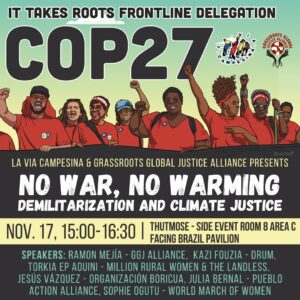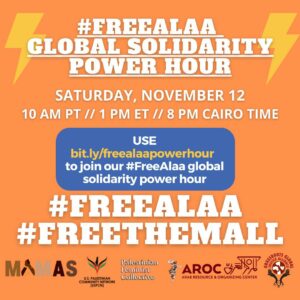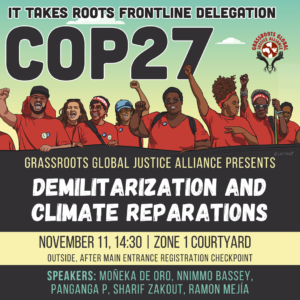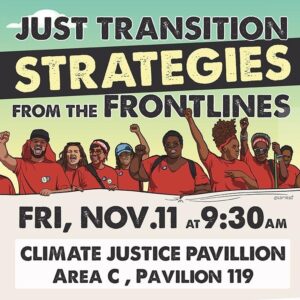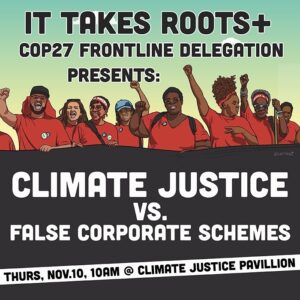27th UNFCCC Conference of the Parties (COP27)
It Takes Roots to Change the System

This November 2022, GGJ members are in Sharm El Sheikh, Egypt with our sister alliances: Climate Justice Alliance, Indigenous Climate Action, Indigenous Environmental Network, Just Transition Alliance, and The Black Hive at Movement for Black Lives to mobilize together as the It Takes Roots frontline delegation to the 27th UNFCCC Conference of the Parties (COP27).
We bring solutions centering the leadership of Black, Indigenous, Latinx, Arab, Asian, Pacific Islander, rural, and urban frontline communities — those most impacted by climate pollution and disaster — and joining calls for real climate solutions that are grounded in human rights and justice.
Even now, as people over the world suffer record-breaking climate devastation, the COP remains captured by fossil fuel interests. Fossil fuel corporations continue to profiteer off false solutions like carbon offsets and trading, while movements of impacted peoples from around the world are demanding and building real solutions.
Learn more about our work at COP27!
- Press and media
- GGJ and coalition events during COP27
- The need for climate reparations now
- Uplifting human rights and Indigenous Rights
- No false solutions — Keep it in the ground
- Why we must demilitarise to stop climate change
- The role of gender justice in climate justice
- We demand systems change
- Members of our delegation
- The People’s Solutions Lens
- Resources
Media contacts:
Kafia Ahmed, kafia.ahmed [at] gmail [dot] com
Adrien Salazar, adrien [at] ggjalliance [dot] org
Interested in speaking with members of our delegation? Please email us to get in touch.
Press and media
- U.S. Delegation of Frontline Activists Demand Community Solutions, Reparations and Human Rights Be Central to Global Climate Commitments at COP27
November 7, 2022 - North American Frontline Delegates at COP27 Release Statement Against U.S. “Energy Transition Accelerator” Carbon Credit Program
November 9, 2022 - Cop27: Climate activists slam hostile and ‘impossible’ environment in Egypt
Middle East Eye | November 9, 2022 - What is climate finance and how does it work?
Deutsche Welle | November 9, 2022
Delegation member Emem Okon on loss and damage - Frontline Military Impacted Communities Speak Out at COP27 in Sharm El Sheikh, Egypt
November 10, 2022 - COP27 Activists Rally in Solidarity with “Silenced” Rights Advocates
TAG 24 | November 10
Delegation member Siwatu-Salama Ra on protecting human rights - Jailed Egyptian hunger striker had medical intervention: Family
Al Jazeera | November 10, 2022
Delegation member George Galvis speaks about incarceration - Global alliance protests at COP27, links climate crisis to incessant wars
Enviro News Nigeria | November 11, 2022
Speakers talk about demilitarization at our action - Indigenous Women at COP27: No More Stolen Relatives, No Greenwashing
San Francisco Bay Area Independent Media Center | November 15, 2022
Delegation member Julia Bernal on Indigenous Rights, real solutions, and MMIW - Frontline Leaders Decry Lack of Progress for Real Climate Justice at COP27 and Call for Further Action to Protect Millions of Lives
November 20, 2022
Events
Tuesday, November 8
** Wear Green in solidarity with African women as the COP begins
- Moneka de Oro of Micronesia Climate Change Alliance speaks at the event Real Solutions and Positive Changes
12:30 → Room: Climate Education Hub - Panel with Jacqueline Patterson, the Founder and Executive Director of the CJA member group Chisholm Legacy Project
13:30 → Climate Justice Pavillion - Indigenous Climate Action Panel
13:45 → Room: Canadian Pavilion - Human Rights Panel with Sanaa Seif, sister of of jailed Egyptian-British activist Alaa Abd El-Fattah, Human Rights Watch & Amnesty International
18:30 → Room: Germany Pavilion
Wednesday, November 9
- ACTION: Loss & Damage and Climate Reparations
Asian Peoples Movement on Debt & Development, and Demand Climate Justice
8:00 → location in the Blue Zone TBA
Thursday, November 10
**Wear White for Human Right and in Solidarity with Political Prisoners
- ACTION: Human Rights Banners: There is no Climate Justice Without Human Rights
Demand Climate Justice
8:00 → location in the Blue Zone TBA - Climate Justice vs. False Solutions panel
10:00–11:30 → Room: Climate Justice Pavillion - Indigenous Rights and Sovereignty: Moving Beyond Carbon Markets and Other False Solutions
11:15 → Room: IP Pavilion - BIPOC2COP: Youth Challenges and Solutions from Frontline Communities
15:00 → Room: Canadian Pavilion - ACTION: There is No Climate Justice Without Human Rights (Demand Climate Justice)
15:00 → location in the Blue Zone TBA
Friday, November 11
**Wear Blue for Flood Impacted Communities and Climate Frontlines**
- Just Transition Panel
09:30 → Room: Climate Justice Pavilion - Feminist Green New Deal Press Conference
14:00 → Room: Press Conference Room 2 - Demilitarization Action by Grassroots Global Justice Alliance
14:30 → Location: Zone 1 Courtyard — outside, after main entrance registration checkpoint - Flood the COP Action led by Demand Climate Justice
Time & Location Blue Zone TBA
Saturday, November 12
- International Day of Action
- Water Ceremony
Time to be announced – Rolling Actions in the Blue Zone through the day. - Indigenous Environmental Network’s Building a Future with Real Solutions
13:15–14:45 → Room: Akhenaten (150)
Monday, November 14
- A Global ‘Farmers Market’ UNFCCC Farmers Constituency
11:20–12:20 → Room: Capacity Building Hub - The Feminist Agenda for a Green New Deal in the United States
12:15–1:15 → Room: Climate Justice Pavilion - Building Global Black Diasporic Solidarity
13:30 → Room: Climate Justice Pavilion - Colonialism, Climate Change and Indigenous Peoples
15:15–16:30 → Room: Indigenous Pavilion - Zero Waste as Climate Justice – Frontline Solutions to Emissions from the Plastics and the Petrochemical Sector
15:30–16:30 → Room:Climate Justice Pavillion - Small Islands: Staging Afloat and Alive at 1.5 Celsius
18:00 → Room: Climate Action Pavilion
Tuesday, November 15
**Wear Red for Missing and Murdered Indigenous Women**
- Don’t Gas Africa Storm — by Don’t Gas Africa
9:00 → COP Entrance - Young Scholars and Research for Environmental Justice Panel
10:30 → Climate Justice Pavillion - ACTION: Missing and Murdered Indigenous Women, 2-Spirit and Gender Expansive People
15:00 → Monolith BLUE ZONE
Wednesday, November 16
- Action on False Solutions
9:00 → Room: Zone 1 main entrance - Frontline Solutions to the Climate Crises: How communities adapt, respond, and fight Climate Change (official UN side event)
15:00–16:30 → Room: Zone B, Room 1, Akhenaten - Peoples’ Solutions to the Climate Crisis
16:45–18:15 → Room: Zone B, Room 1, Osiris (300)
Thursday, November 17
- No War, No Warming: Demilitarization and Climate Justice
15:00–16:30 → Room: Zone B, Room 1, Amon (150)
Friday, November 17
- Tagamoa: Convergence of the Peoples (COP)
16:30–18:00 → Location in the Blue Zone to be announced
Climate Reparations Now
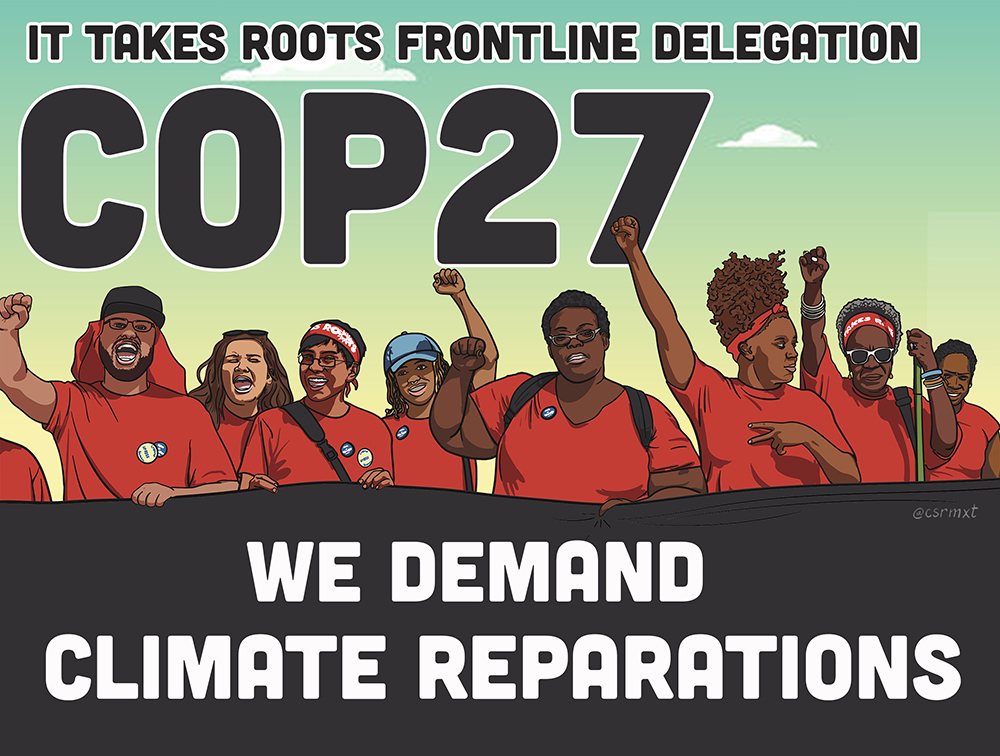
One of the most central negotiations at COP27 is how to fund climate loss and damage. Global North countries responsible for the vast majority of historic greenhouse gas emissions owe a massive debt to Global South countries that are disproportionately impacted by climate disasters.
We align with demands for climate reparations to be paid by the U.S. as the leading driver of the global climate crisis and from other Global North countries that have benefitted from centuries of colonialism and extractivism. This includes foreign debt cancellation and direct funding to impacted communities through public grants.
Climate reparations must center Black, Indigenous, and frontline impacted communities, including transparent governance and robust community engagement. We oppose strings-attached finance mechanisms from institutions like the World Bank and the International Monetary Fund that draw profits from people’s suffering for Global North countries and corporations.
Human Rights and Indigenous Rights
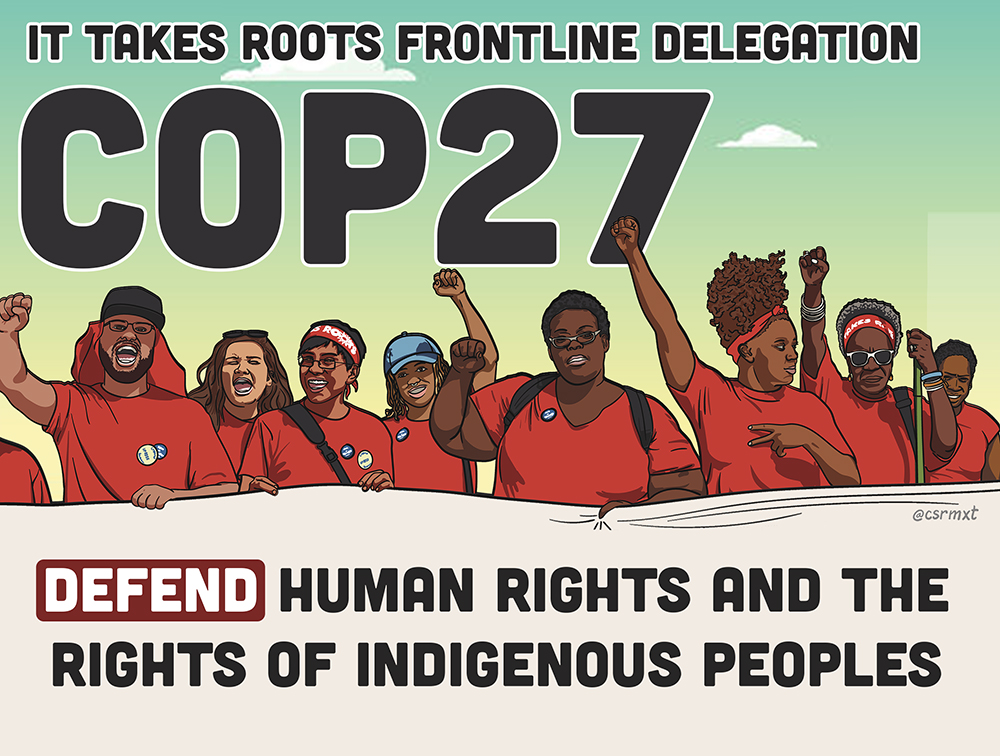
We stand in solidarity with calls to respect and uphold human rights in all aspects of the UNFCCC negotiations in recognition of the struggle of political prisoners and prisoners of conscience everywhere. The conditions in Egypt, as well as human rights abuses perpetrated by the United States, make human rights a central concern of the global negotiations. The outcomes of this COP and the continued implementation of the Paris Agreement must protect the rights of environmental defenders and ensure that any governmental action on climate does not violate human rights and Indigenous rights.
No False Solutions — Keep it in the Ground
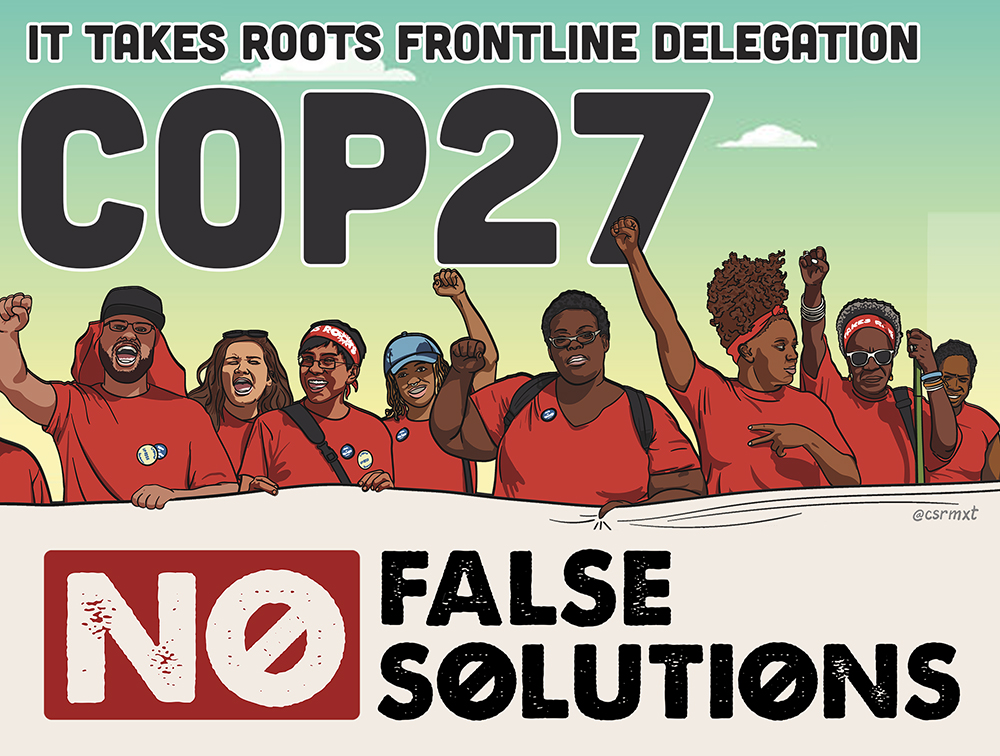
At COP26 in Glasgow, states finished negotiations on the Paris Agreement Rulebook, including finalizing Article 6 which governs global carbon markets. Unfortunately, this locked in a regime that maintains the opening for false, market-based climate solutions. To hold polluters accountable, the UNFCCC must end fossil fuel collusion at the COP and the illusion of net zero. We demand an end to false solutions in the implementation of the Paris Agreement like carbon trading, offset mechanisms, carbon capture and sequestration, hydrogen energy, large hydro-electric dams, and biofuels.
Globally, Black, Indigenous, and frontline communities — where extractive industries are based — are leading movements for a Just Transition from the fossil fuel economy. Real climate solutions must include cutting emissions at their source and directly regulating polluting industries like refineries, incinerators, agrobusiness, and military jet fuel.
Decolonize, Demilitarise, Decarbonize
Colonial extraction is at the root of climate chaos. Communities across the U.S. and globe are devastated by military occupation, war, and state-sanctioned violence that support fossil fuel expansion. The U.S. military is the world’s single largest consumer of fossil fuels, enforcing the occupation of Indigenous and sovereign lands while upholding violent resource extraction.
Yet, military pollution remains excluded from international climate negotiations, and was not addressed by the 2015 Paris Agreement. The UNFCCC must confront the military industrial complex to address climate change. A Just Transition to a Regenerative Economy will divest from wars, criminalization, and the violence of militarized forces and police.
Gender Justice is Climate Justice
Building a Just Transition requires investing in a feminist economy and the care sector, and following the leadership of women and femme-identifying people. With climate change increasing conflict and migration, women, femmes, and girls are at higher risks of harm like trafficking and gender-based violence. In North America, an epidemic of missing and murdered Indigenous women, girls, femmes, two-spirit, and gender expansive people continues unabated at sites of fossil fuel extraction where “man camps” crop up.
Reversing climate crisis means defending justice, dignity, and sovereignty for women, femmes, and gender expansive people. In a feminist economy, we recognize, value, and center reproductive labor — low-carbon, community-generating, life-affirming, and skilled work — that is necessary for our well-being and to sustain society and nature itself. An economy of care and stewardship is the path to a regenerative economy.
Systems change not climate change
We call for an end to the capture of the international climate negotiations by greedy fossil fuel corporations, and the climate injustice perpetrated by Global North countries whose wealth is fueled by centuries of colonial extractivism. The basis of a renewed future must be grassroots leadership advancing real solutions for a Just Transition to a Regenerative Economy — an economy based in food sovereignty, energy democracy, free prior and informed consent of Indigenous Peoples and communities, climate reparations, demilitarization, and gender justice.
GGJ’s Delegation of Member Leaders include:
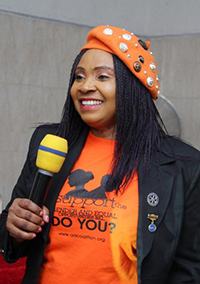
Emem Okun, ecofeminist, Nigeria
Founder and Executive Director of Kebetkache Women Development & Resource Centre
Emem Okon is a feminist activist, grassroots mobilizer, gender specialist, social change advocate, Pan-Africanist and a development practitioner who has successfully led grassroots campaigns in the Niger Delta region of Nigeria and in the African region with over 20 years experience in the nonprofit sector. Emem specializes in practical issues associated with gender, women empowerment, grassroots mobilization, climate change, women peace and security, gender and extractives, and development practices as it affects women in rural communities. Emem is currently the Founder and Executive Director of Kebetkache Women Development & Resource Centre; She is Co-Chair of the Board of Trustees of WoMIN African Alliance, an African regional women-led organization alliance of women organizations and community women groups working on gender and extractives. Emem is also one of the Alternate members of the Governing Council to the Hydrocarbon Pollution Remediation Project (HYPREP) on the implementation of the remediation programme in Ogoniland.
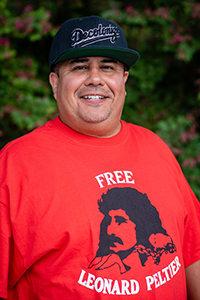
George Galvis, Communities United for Restorative Youth Justice (CURYJ), Oakland, California
Executive Director of Communities United for Restorative Youth Justice
Since 1993, George Galvis has promoted restorative justice and healing to transform lives and has been an advocate and organizer for elevating the power of young people most affected by criminalization and violence. Galvis is the Co-founder and executive director of Communities United for Restorative Youth Justice (CURYJ, pronounced “courage”). He draws from personal experience and his Indigenous roots to help young people, particularly those involved in the criminal justice system, become community leaders for positive change. George is a proud co-founder of All Of Us Or None, Board Chair for both Legal Services for Prisoners with Children and the Circle for Justice Innovation Fund, and is the Board secretary for the Formerly Incarcerated and Convicted People’s and Families Movement.
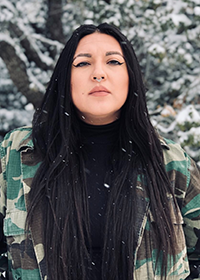
Julia Bernal, Pueblo Action Alliance, Albuquerque, New Mexico
Alliance Director of Pueblo Action Alliance
Julia Bernal (they/she) is from the Indigenous Nations of Sandia Pueblo and Yuchi and is the Executive Director of the Pueblo Action Alliance. They are pursuing dual masters degrees in Water Resources and Community and Regional Planning at the University of New Mexico. She advocates for Water Back, Land Back, the rematriation of all stolen water resources and ancestral lands and the decommodification of all that is sacred. She serves on the Natural Resources Committee for the All Pueblo Council of Governors, and is a board member of the Middle Rio Grande Water Advocates.

Kali Akuno, Cooperation Jackson, Jackson, Mississippi
Co-Founder & Co-Director of Cooperation Jackson
Kali Akuno is a co-founder and director of Cooperation Jackson, which is an emerging network of worker cooperatives and supporting institutions. Cooperation Jackson is fighting to create economic democracy by creating a vibrant solidarity economy in Jackson, MS that will help transform Mississippi and the South. You can find more information about Cooperation Jackson at www.CooperationJackson.org. Kali served as the Director of Special Projects and External Funding in the Mayoral Administration of the late Chokwe Lumumba of Jackson, MS. His focus was supporting cooperative development, sustainability, human rights and international relations. Kali Akuno is an organizer, educator, and writer for human rights and social justice. He is the former Co-Director of the US Human Rights Network. Kali also served as the Executive Director of the Peoples’ Hurricane Relief Fund (PHRF) based in New Orleans, Louisiana after Hurricane Katrina.

Kazi Fouzia, Desis Rising Up and Moving (DRUM), Jackson Heights, New York
Director of Organizing at Desis Rising Up and Moving (DRUM)
Kazi Fouzia is the Director of Organizing at DRUM – Desis Rising Up & Moving, a grassroots, community organization based in NYC that builds the power of working-class, South Asian and Indo Caribbean communities to fight for policy and social change. Kazi comes from a long history of struggles for justice. In Bangladesh, Kazi was a community organizer involved with a street vendors union, free community health clinics, and free education for slum children. She worked with several community and women’s organizations such as Women Watch Bangladesh, a national union of the small and cottage industry. Kazi immigrated from Bangladesh to the U.S. in 2008, and became a designer and seamstress at retail sari shops in Jamaica and Jackson Heights, Queens which led her to DRUM’s worker center. In the aftermath of the catastrophic floods Pakistan has recently experienced, DRUM is launching a campaign for Temporary Protected Status (TPS) designation for Pakistan.
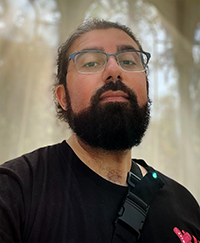
Sharif Zakout, Arab Resource and Organizing Center (AROC), Bay Area, California
Membership Coordinator & Organizer at Arab Resource & Organizing Center
Sharif Zakout is an organizer with the Arab Resource & Organizing Center (AROC) based in the Bay Area. For the last 9 years, he has served working class and immigrant Arab and Muslim community by connecting our struggles in our homelands related to war and occupation, to the struggles of other communities impacted by policing and state repression in the Bay. He loves to create art and music that uplifts his Palestinian roots.
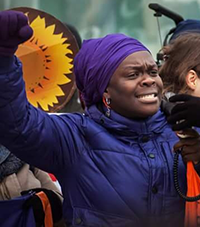
Sofia Ogutu, World March of Women, Kenya
World March of Women, Kenya
Sophie D. Ogutu, is a militant feminist in Kenya currently organizing with the international grassroots’ women’s movement — the World March of Women and also the director of a progressive human rights theatre company that does progressive popular education for social transformation called the 5Cs Human rights company. A dedicated rights defender, a mother, a mentor, a social justice activist, a grassroots mobiliser, Sophie is active in a number of organizations across Kenya. As an ecofeminist, Sophie has been building power at the intersections where women are so often those most vulnerable in the conditions of escalating climate crises in Kenya and internationally. She is currently working directly with women from Turkana county where there is severe drought.
The People’s Solutions Lens for Climate and Economic Policy Proposals at COP27
It can be difficult to keep up with the slew of climate solutions that are going to be discussed at COP27, and not all “solutions” are inherently equitable or just. We’d like to share five straight-forward questions from the Climate Justice Alliance that can help you separate false solutions from the real deal. Use the People’s Solutions Lens to determine whether the various policy proposals that are being brought forward at COP27 are rooted in justice for workers, frontline communities, and the environment.
Resources

